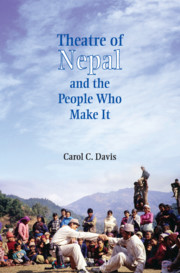Book contents
- Frontmatter
- Dedication
- Contents
- List of Figures
- Acknowledgements
- Prologue
- 1 From Darkness to Light: Antiquity through the Malla Golden Age
- 2 Ruthless Rulers: The Rise of the Shah and the Rana Takeover
- 3 The Drama of Nationalism: Sama Engaged
- 4 Modernism's Advance: Post-Sama Dramatists
- 5 The Pro-Democracy Movement: Ashesh Malla Takes to the Streets
- 6 Cultivating Theatre Aesthetics: Sunil Pokharel's Vision
- 7 Diaspora: Urban Theatre Outside the Capital
- 8 Legacy: Contemporary Theatre in the Kathmandu Valley
- Bibliography
- Index
8 - Legacy: Contemporary Theatre in the Kathmandu Valley
Published online by Cambridge University Press: 26 April 2019
- Frontmatter
- Dedication
- Contents
- List of Figures
- Acknowledgements
- Prologue
- 1 From Darkness to Light: Antiquity through the Malla Golden Age
- 2 Ruthless Rulers: The Rise of the Shah and the Rana Takeover
- 3 The Drama of Nationalism: Sama Engaged
- 4 Modernism's Advance: Post-Sama Dramatists
- 5 The Pro-Democracy Movement: Ashesh Malla Takes to the Streets
- 6 Cultivating Theatre Aesthetics: Sunil Pokharel's Vision
- 7 Diaspora: Urban Theatre Outside the Capital
- 8 Legacy: Contemporary Theatre in the Kathmandu Valley
- Bibliography
- Index
Summary
Out of all the echoes of chaos and violence, we are anxious to hear the echoes of tomorrow
— Shiva RijalIn the past 30 years, as Nepal wrestled with its form of government, moving from monarchy to republic through protracted war, theatre in Kathmandu has taken off. Men who had worked with Ashesh Malla and Sunil Pokharel in activist theatre formed and directed new theatre troupes in Kathmandu training younger generations of theatre makers. Women began to write and direct plays, claiming their place on the Nepali stage. Theatre artists grappled with identity, as they always had, developing resonating material both home-grown and imported, trying to claim their cultural heritage on the one hand, participate with the contemporary world on the other, and ultimately capture that which is quintessentially Nepali.
During the final push for democracy in the late 1980s and soon afterwards, theatre activists established groups that would prove to be influential on younger artists. Kathmandu-based artist Pushkar Gurung founded Dabali (Raised Stage) in 1985, Birendra Hamal founded M. Art Theatre Group in 1988, Bijay Bisfot founded Rang-Sarathi (Feeling Companions) Theatre Group in 1989, and Anup Baral from Pokhara moved to Kathmandu in 1990 and established The Actors’ Studio. Each of these men brought their own style and vision to their group, while maintaining qualities and interests similar to those with whom they had previously worked. For three decades, these men have been at the centre of theatre production in the capital. Today, some of their most lasting contributions may be in relation to the younger artists they trained, directed, and inspired.
An important mover and shaker in theatre and film in Kathmandu, Pushkar Gurung (b. 1963) was born in the mountainous region east of the capital. A strong actor and director, Gurung is a theatre organizer who gained more international experience than many of his contemporaries. Gurung was one of the early members of Sarwanam, performing in many of Malla's most influential political plays during the pro-democracy movement, including Hami Basanta Khojirahechau (We Are Searching For the Spring, 1982), Sadekdekhi Sadaksamma (From Street to Street, 1984), the 1984 restaging of Tuwalole Dhakeko Basti (A Cluster of Houses Covered With Haze, 1976), and others.
- Type
- Chapter
- Information
- Theatre of Nepal and the People Who Make It , pp. 113 - 148Publisher: Cambridge University PressPrint publication year: 2019



